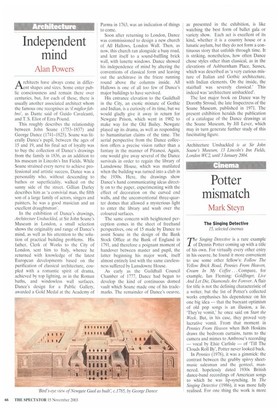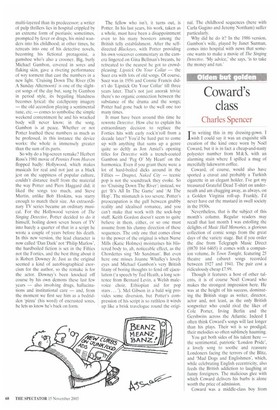Potter mismatch
Mark Steyn
The Singing Detective 15, selected cinemas The Singing Detective is a rare example of Dennis Potter coming up with a title of his own. For virtually every other entry in his oeuvre, he found it more convenient to use some other fellow's: Follow The Yellow Brick Road, Pennies From Heaven, Cream In My Coffee . . Compare, for example, Ian Fleming: Goldfinger, Live And Let Die, Diamonds Are Forever. A flair for title is not the defining characteristic of a writer, but the list of Potter's collected works emphasises his dependence on his one big idea — that the buoyant optimism of old pop songs is an illusion, a lie. 'They're vomit,' he once said on Start the Week. But, in his case, they proved very lucrative vomit. From that moment in Pennies From Heaven when Bob Hoskins draws the bedroom curtains, turns to the camera and mimes to Ambrose's recording — vocal by Elsie Carlisle — of 'Till The Clouds Roll By', Potter never looked back.
In Pennies (1978), it was a gimmick: the contrast between the grubby spivvy sheetmusic salesman and the genteel, mannered, hopelessly dated 1930s British dance-band recordings of American songs to which he was lip-synching. In The Singing Detective (1986), it was more fully realised. For one thing the work is more multi-layered than its predecessor: a writer of pulp thrillers lies in hospital crippled by an extreme form of psoriasis; sometimes, prompted by fever or drugs, his mind wanders into his childhood; at other times, he retreats into one of his detective novels, becoming his fictional protagonist, a gumshoe who's also a crooner. Big, burly Michael Gambon, covered in sores and flaking skin, gave a riveting performance of wry torment that cast the numbers in a new light. 'Cruising Down The River (On A Sunday Afternoon)' is one of the slightest songs of the day but, sung by Gambon in period style, its beguiling blandness becomes lyrical: the catchpenny imagery — the old accordion playing a sentimental tune, etc. — conies to symbolise the simple weekend contentment he and his wracked body will never know; in the song, Gambon is at peace. Whether or not Potter loathed these numbers as much as he professed, in this instance the device works: the whole is immensely greater than the sum of its parts.
So why do a big-screen remake? Herbert Ross's 1981 movie of Pennies From Heaven flopped badly: Hollywood, which makes musicals for real and not just as a black jest on the sappiness of popular culture, couldn't distance itself from the material the way Potter and Piers Haggard did; it liked the songs too much, and Steve Martin, unlike Bob Hoskins, was starry enough to match their size. An extraordinary TV series became an ordinary musical. For the Hollywood version of The Singing Detective, Potter decided to do it himself, boiling down seven hours of TV into barely a quarter of that in a script he wrote a couple of years before his death. In this new version, the lead character is now called 'Dan Dark' not 'Philip Marlow', the hardboiled fiction is set in the Fifties not the Forties, and the best thing about it is Robert Downey Jr. Just as the original seemed a kind of autobiographical exorcism for the author, so the remake is for the actor. Downey's been knocked off course by his own demons these last few years — also involving drugs, hallucinations and institutional care — and, from the moment we first see him as a bedridden 'pizza' (his word) of encrusted sores, he lets us know he's back on form. The fellow who isn't, it turns out, is Potter. In his last years, his work, taken as a whole, must have been a disappointment even to his many boosters among the British telly establishment. After the selfdirected Blackeyes, with Potter providing his own voiceover commentary as the camera lingered on Gina Bellman's breasts, he retreated to the nearest he got to crowdpleasing: Lipstick On Your Collar — the Suez era with lots of old songs. Of course, Suez was in 1956 and Connie Francis didn't do 'Lipstick On Your Collar' till three years later. That's not just anorak trivia: there's no organic connection between the substance of the drama and the songs; Potter had gone back to the well one too many times.
It must have been around this time he rewrote Detective. How else to explain his extraordinary decision to replace the Forties hits with early rock'n'roll from a decade later? You'd be hard put to come up with anything that sums up a genre quite so deftly as Jon Amiel's opening titles for Detective with a trench-coated Gambon and 'Peg 0' My Heart' on the harmonica. Even if you grant there were a lot of hard-boiled dicks around in the Fifties — Dragnet, Naked City — teenie pop is not the soundtrack they evoke. So no 'Cruising Down The River.; instead, we get 'It's All In The Game' and 'At The Hop'. The mismatch is too severe. Potter's preoccupation is the gulf between grubby reality and idealised romance, and you can't make that work with the sock-hop stuff. Keith Gordon doesn't seem to quite believe in them, either, or so one must assume from his clumsy direction of these sequences. The only one that comes close to the power of the original is when Nurse Mills (Katie Holmes) moisturises his blistered body to, ah, noticeable effect, as the Chordettes sing 'Mr Sandman'. But even here one misses Joanne Whalley's lovely eyes and Michael Gambon's very British litany of boring thoughts to fend off ejaculation Ca speech by Ted Heath, a long sentence from Bernard Levin, a Welsh malevoice choir, Ethiopian aid for pop stars ... '). Mel Gibson in a bald wig provides some diversion, but Potter's compression of his script is so ruthless it winds up like a brisk travelogue round the origi
nal. The childhood sequences (here with Carla Gugino and Jeremy Northam) suffer particularly.
Why did he do it? In the 1986 version, Gambon's wife, played by Janet Suzman, comes into hospital with news that someone wants to make a movie of The Singing Detective. 'My advice,' she says, 'is to take the money and run.'



























































































 Previous page
Previous page